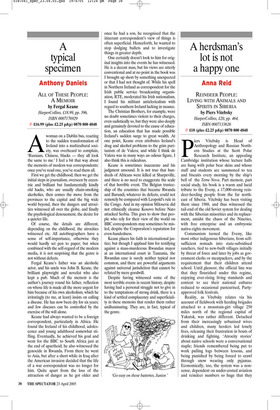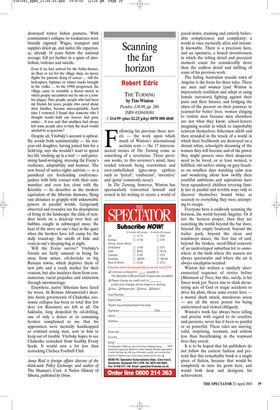A herdsman’s lot is not a happy one
Anna Reid
REINDEER PEOPLE: LIVING WITH ANIMALS AND SPIRITS IN SIBERIA by Piers Vitebsky HarperCollins, £20, pp. 464, ISBN 0007133626 ✆ £18 (plus £2.25 p&p) 0870 800 4848 Piers Vitebsky is Head of Anthropology and Russian Northern Studies at the Scott Polar Research Institute, an appealing Cambridge institution whose lecture halls are hung with polar bear skins and whose staff and students are summoned to tea and biscuits every morning by the ship’s bell of the Terra Nova. Part memoir, part social study, his book is a warm and lucid tribute to the Eveny, a 17,000-strong reindeer-herding people from the far northeast of Siberia. Vitebsky has been visiting them since 1988, and thus witnessed the tail-end of the old Soviet system for dealing with the Siberian minorities and its replacement, amidst the chaos of the Nineties, with free enterprise and an embryonic native-rights movement.
Communism turned the Eveny, like most other indigenous Siberians, from selfsufficient nomads into state-subsidised ranchers, tied to new-built villages initially by threat of force and later by jobs as government clerks or meatpackers, and by the requirement that their children attend school. Until glasnost, the official line was that they flourished under this regime, enjoying ever-rising living standards and content to see their national cultures reduced to occasional pasteurised, Partyapproved folk festivals.
Reality, as Vitebsky relates via his account of fieldwork with herding brigades attached to a mountain-girt village 250 miles north of the regional capital of Yakutsk, was rather different. Detached from their increasingly urbanised wives and children, many herders led lonely lives, releasing their frustration in bouts of drinking and fighting. ‘Atrocity stories’ about native schools were a conversational staple; friends remembered being put to work pulling logs between lessons, and being punished by being forced to crawl through snow wearing only pyjamas. Economically, too, the system was a nonsense, dependent on under-costed aviation and reindeer numbers so huge that they destroyed winter lichen pastures. With communism’s collapse its weaknesses were brutally exposed. Wages, transport and supplies dried up, and native life expectancy, already 18 years below the national average, fell yet further in a spate of alcoholism, violence and suicide.
Even if no fuel arrived for the boiler-houses, no flour or tea for the village shop, no mercy flights for patients dying of cancer ... still the helicopters, biplanes or winter trucks brought in the vodka ... As the 1990s progressed, the village came to resemble a horror movie in which people succumbed one by one to a zombie plague. Nice people, people who had been my friends for years, people who cared about their families, became unrecognisable. Each time I returned, I found that someone who I thought would hold out forever had gone under... It was said that smallpox had always left some people alive to bury the dead: would alcohol be so gracious?
Despite all, Vitebsky’s account is upbeat. He avoids both sentimentality — his tenyear-old daughter, having joined him for a field-trip, says she wouldn’t want to spend her life ‘washing up in a tent’ — and patronising hand-wringing, stressing the Eveny’s resilience, adaptability and humour. The new breed of native-rights activists — to a jaundiced eye freeloading conferencejunkies with little contact with their communities and even less clout with the Kremlin — he describes as the modern equivalent of the Siberian shamans, flying vast distances to grapple with unknowable powers in parallel worlds. Gorgeously observed and evocative are his descriptions of living in the landscape: the click of reindeer hoofs on a dried-up river bed; air bubbles caught in submerged moss; the heat of the stove on one’s face in the quiet when the herders have left camp for the daily round-up; the smells of hide and resin in one’s sleeping-bag at night.
Will the Eveny survive? Vitebsky’s friends are fairly unusual in being far away from mines, oil-derricks or big Russian towns, which deprives them of new jobs and a ready market for their venison, but also insulates them from consumerism, racial prejudice and extinction through intermarriage.
Elsewhere, native Siberians have fared far worse. In Roman Abramovich’s desolate Arctic governorate of Chukotka, economic collapse has been so total that few deer (or Russians) are left at all. On Sakhalin, long despoiled by oil-drilling, one of only a dozen or so remaining herders complained to me that his apprentices were mentally handicapped or criminal young men, sent to him to keep out of trouble. Vitebsky hopes to see Chukotka restocked from healthy Eveny herds. It would cost a lot less than restocking Chelsea Football Club.




















































 Previous page
Previous page